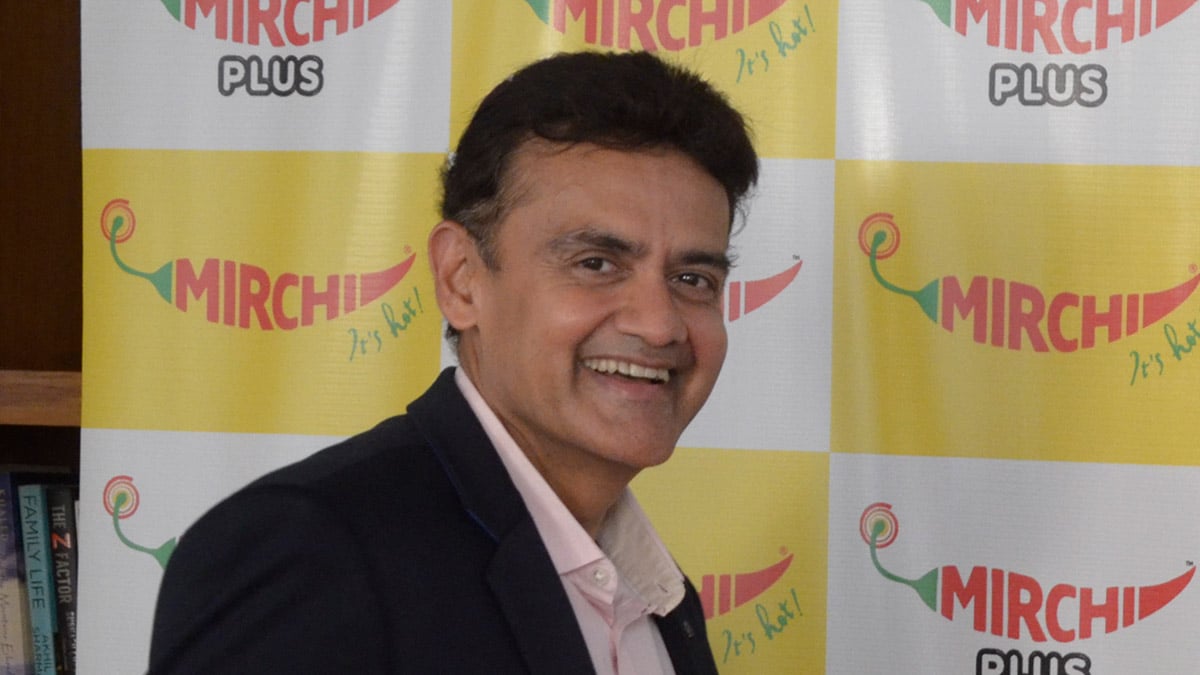Prashant Panday is the outgoing CEO of Mirchi, which is owned by the Entertainment Network India Ltd. (ENIL) and is the largest commercial radio brand in the country. An electronics engineer with an MBA, he’s spent his career with consumer brands — first at Citibank, then at advertising agency Mudra, where he learned the basics of branding, then onto fast moving consumer goods companies, including Pepsi, Unilever and Revlon, where he headed the marketing division. Panday joined Mirchi as COO in 2000, and says he’s always considered it a consumer brand, not merely a media brand. Before passing the baton to Yatish Mehrishi in June, he shares some of the secrets of tenure and what he learned along the way.
RedTech: You’ve been at Mirchi for over 20 years, starting as COO and eventually running the company from May 2014. What were some of your biggest challenges and some of your greatest successes?
Prashant Panday: I’ve been CEO for over 15 years and managing director for the last 10 years. The first obvious challenge when I joined the firm was that India had no radio industry. There was a state broadcaster, All India Radio, that very few people listened to, and TV was booming. Private TV arrived in the country in 1992, and in 2000, Rupert Murdoch’s Star TV had just transformed from English to mainstream Hindi and launched the Indian version of “Who Wants to Be a Millionaire,” featuring India’s biggest superstar Amitabh Bachchan. So, getting listeners to listen and advertisers to advertise was a huge challenge.
Getting people to join the company was also a challenge. The government policy that ushered in private radio in 2000 was flawed, and in the five years before the change, all radio players lost huge amounts of money. Survival itself was a challenge. Further, no one in India knew anything about radio programming, though my group (Times Group) had earlier run some radio shows on All India Radio for a few years. There was no private capital available to invest or loans for a business that appeared to be coming too late. Promoters had to fund operations, and losses, on their own. So, it was a very tough environment.
But what inspired us was the vision of our chairman, Mr. Vineet Jain, who had pushed the group into radio in the first place. And the resources that the Times Group brought to the table in terms of hard cash, advertising in group media outlets, the ability to recruit the best, and relationships and reputation with advertisers and advertising agencies. The Times Group had a number of top-ranked brands in all its print businesses and a strong presence in digital with Times Internet. So, the expectations from Mirchi were no less than being a leader!
I think our biggest success is that we have been the number-one radio brand in India for the last 23 years. Today, I can say confidently that our lead is unassailable. Along the way, we worked with other broadcasters and built a vibrant radio industry, reaching about 200 million Indians (12+ in age) every week. This is almost 75% of the urban Indian population where radio service is available. Radio, until recently, was the primary medium for the discovery and consumption of music. Even today, with music OTTs spread widely, radio continues to be an important medium for both. I am also proud that we have created a network of 73 stations spread across 63 cities in India and also made the brand available in the United States, Qatar, Bahrain and the UAE.
In the last five years, what I would call a big success is that we have moved the Mirchi brand beyond radio — we even dropped “radio” from our brand name. We are now simply called Mirchi. We have a strong presence in videos, with 15 million+ subscribers on our YouTube channels, generating more than 125 million views every month, and we are very big in on-ground events and concerts.
We have pioneered a “solutions” business that combines the power of radio and other media to generate stronger results for advertisers, and within that, a new business vertical called Digital Content Solutions. To sum it all up, I think we have innovated quite a lot on the listenership, viewership and revenue sides.
Removing “radio” from the brand is important for the CEO to realize the brand’s full potential.
RedTech: Reflecting on your career, based on what you know today, what advice would you give a young Prashant starting in radio as the COO of Radio Mirchi in August 2000?
Panday: Nothing new! Prashant would know it’s important to be humble, keep learning new things, respect people and build long-lasting relationships. On a serious note, though, I would tell Prashant what I tell every new person who joins us. Stay in the company for 5–7 years minimum.
It takes that long to make a positive contribution to the company and to your own career. Always demand more and more work —18 hours a day, seven days a week, but maintain a work-life balance through smart usage of free time. Never stop enjoying even a single day. If and when work becomes a bother, change the mix. And finally, stay physically and mentally fit. Exercise, work hard and play hard!
RedTech: How is the job of a radio CEO different today to when you got started in the industry?
Panday: Today, the job of a radio CEO is to understand that the job is not that of a radio CEO at all. It’s vital to remove “radio” from the radio brand. But it is also vital to remember that none of these brands would exist without radio. That same radio is still extremely powerful today, with a daily reach inside the most influential car audiences and youth audiences running into the millions.But removing “radio” from the brand is important for the CEO to realize the brand’s full potential. The brand’s users have transitioned to everything digital; the brand must follow its users into that space. Today’s radio CEO should think of themselves as the CEO of a youth brand… or an adult brand… and become agnostic to the medium itself.
RedTech: What qualities make for a great radio CEO?
Panday: Any CEO must be humble — know they are not the fount of all wisdom. Be able to attract key creative and business talent. Keep abreast of all the latest developments in technology, content and marketing. Have strong relationship-building skills with film and music celebrities. And, of course, have the skills to use all of these to build strong profitability for the company and valuations for investors.
RedTech: How do you expect radio as a medium to change over the next five years?
Panday: Radio could go in two different ways. I’m not sure which direction it’ll eventually go. One very attractive way it could go is if smartphone manufacturers put FM tuners back in. There are regulatory reasons for this to happen. In emergencies and natural disasters, telecom networks crumble. Only radio keeps working and informing people about measures to take. In Mexico and Brazil, regulators have mandated FM tuners in smartphones. Hopefully, India also will make this happen. In this scenario, radio will remain youthful, but cater to both young and adult audiences.
But if this does not happen, I think radio will become a more niche medium, catering to wealthy, older, in-car audiences with a stronger presence in big cities where advertisers spend most of their money. In both scenarios, though, I see radio remaining mainstream for at least the next decade.
RedTech: What are your plans for the future?
Panday: I’m now entering a space that I have been interested in for a long time. I’ve always wanted to involve myself with the digital startups. India has the third largest start-up ecosystem in the world, after the U.S. and Israel.
This is where revolutionary new businesses are being created. So, I am joining a venture capital fund that invests in digital startups. I am joining a fund called Silver Needle Ventures as a partner and member of the investment committee. I hope to be able to provide marketing and growth strategies to companies we invest in…and also beyond. I hope to spend the next 10–15 years in this space.
Read our interview with incoming CEO Yatish Mehrishi here.

